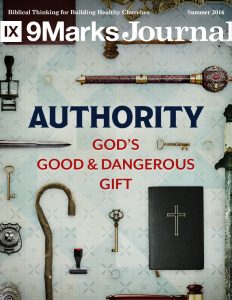
Authority: God’s Good and Dangerous Gift
Authority: God’s Good and Dangerous Gift
by Jonathan Leeman
God’s Good Gift
The Shift from Authority to Preference—and Its Consequences for the Church
by Os Guinness
The Nature of Church Authority
by Jonathan Leeman
Is There Such a Thing as Church Authority?
by Greg Gilbert
What Is the Nature of Pastoral Authority?—Perspectives from a Methodist, a Presbyterian, and a Baptist
by Matt O’Reilly, Kevin DeYoung, and Benjamin Merkle
Is It Self-Serving to Teach on Your Own Authority?
by Bob Johnson and Jeremy Yong
Views of Authority from Around the World
by Tiago J. Santos Filho, Mike Gilbart-Smith, Joshua Fang, and Ryan Hsu
How a Roman Catholic View Compares to a Protestant View
by Gregg R. Allison
God’s Dangerous Gift
Authority, Not Authoritarian
by Taylor Turkington
Don’t Be a 9Marxist!
by Jonathan Leeman
Authority and Its Abuse
by Shai Linne
Redeeming Authority for Those Who’ve Only Know Its Abuse
by Mez McConnell
The Abuse of Authority in Prosperity Gospel Churches
by D.A. Horton
Getting Practical
How Scripture’s Authority Shapes What We Do on Sundays
by Brian Davis
The Sword and the Shepherd’s Staff: Reporting Sexual Abuse to the Authorities
by Travis Wussow
A Pastoral Response to Millennial Autonomy
by Kevin McKay
A Healthy Church Member Is a Humble Follower
by Thabiti Anyabwile
Church Membership: A Single Woman’s Perspective
by Chelsea Patterson
How New Elders Earn Authority
by Clint Humphrey
On the Authority of a Sending Church
by Ken Caruthers
Editor’s Note:
Authority and the Fear Factor
The topic of authority befuddles Westerners today. We don’t like the idea of authority, but it’s difficult to get away from since our lives are suffused by it: hospital procedures, building codes, traffic laws, parental responsibilities, marriage covenants, student requirements, office rules, the laws of state, the grammar of language, the meaning of words—on and on we could go. Authority is the glue and gravity that enables people to live together. Apart from authority, all of life would be determined by the preferences of the moment. There would be no traditions, no predictability of behavior, no stability of meaning, no shared morality.
Behind every authority structure, after all, is a moral evaluation. When we say, “You must do this” or “We must obey him,” we are saying it’s right to do so, and wrong not to do so. We are making a moral claim. The trouble is, we are a society that has destroyed its own ability to say “right” and “wrong.” We have no moral vocabulary left beyond the exaltation of personal desire and identity. Which means: it’s nearly impossible with today’s vocabulary to justify any claim to rightful authority.
Yet how, then, do we organize our lives together? More crucially, how do we enjoy anything of transcendent value that’s worth protecting over time? You protect something with rules. How, in other words, do we live as anything other than beasts whose only law is writ in tooth and claw?
To decry all authority is to decry anything of transcendent value in human life. It is dehumanizing.
Of course, there is a danger in another direction as well. If every set of moral evaluations comes with a matching pair of authoritative structures, who gets to say whose evaluations and structures are right? What if “he” uses “his” evaluations and structures to oppress me? History offers a heart-breakingly long list of such abuses. One group of people creates a moral narrative that enables them to rule over another group of people, exploiting them for personal gain. Reacting to this exploitation and abuse, we become anti-authority and anti-morality. (The irony, of course, is that we assume no individual or group should be abused and exploited because we have inherited the belief from Christianity that all individuals are worthy of respect; but now we’re like the rich spoiled children who love the inheritance and despise the parents who earned it. But that’s a conversation for another day.) Yet we cannot finally escape moral evaluation and authority structures. Life is simply impossible without them, putting Westerners into an unresolvable bind.
What’s the solution? A solution can only be found by pointing to the gospel and the people of the gospel, the church. This is the string that, when pulled, untangles the knot. The church’s moral narrative starts with a word of forgiveness. And those who have been forgiven can no longer lord it over any other person. Still, Jesus is king, which means his rule must bind these people together and govern their lives. In the local church, then, we find a society where heaven’s moral evaluations and authoritative structures are put on display. Any authority exercised in a church should be for the good of the members and the nations. Too often, of course, it’s not.
The goal of this 9Marks Journal is to consider the topic of authority as God’s good and dangerous gift. What is the church’s authority? The pastor’s authority? And what will keep churches and pastors from misusing their authority? Pray with us that this Journal would be used for good and not ill among many congregations. Pray with me that both your heart and mine would be wise to our own potential for self-deception, and that each of us would use whatever stewardships we’ve been given for the good of others and the glory of God.
—Jonathan Leeman
Free Download
PDF, ePub, and Kindle files will be sent to this email address. As part of our community, you will receive content & communication from 9Marks. You may unsubscribe at any time.
